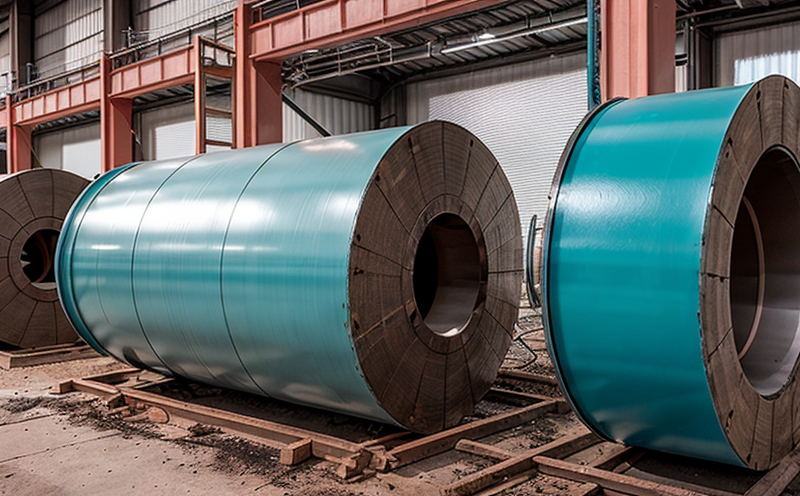ISO 3651 Intergranular Corrosion Testing in Stainless Steels
The ISO 3651 intergranular corrosion test is a critical procedure used to assess the resistance of stainless steels against localized corrosion, particularly intergranular corrosion. This type of corrosion can occur when certain stainless steel grades are exposed to specific heat treatment or welding processes that lead to the formation of chromium-depleted grain boundaries.
The ISO 3651 test involves subjecting a polished sample of the material to an aggressive chloride-containing solution, typically sodium chloride (NaCl), under controlled conditions. The specimen is held in this environment for a specific duration before being visually inspected and graded based on the extent and depth of any corrosion that has occurred.
The primary purpose of this test is to evaluate the effectiveness of different stainless steel grades and their heat treatment processes in preventing intergranular corrosion, which can significantly impact the durability and performance of industrial components. This testing method is widely used across various sectors including aerospace, automotive, chemical processing, medical devices, and construction.
The process begins with careful selection and preparation of the test specimen to ensure it accurately represents the material being evaluated. Following this, the sample undergoes heat treatment if required by the specific alloy or grade being tested. Once prepared, the polished surface is carefully inspected before immersion into the chloride solution.
During immersion in the aggressive environment, the sample remains under tension and at elevated temperatures to simulate real-world conditions more closely. After exposure, visual inspection typically involves examination with a magnifying glass or microscope to identify any signs of corrosion. Grading systems such as those defined by ASTM E459 are often used to assign numerical values based on the observed damage.
The ISO 3651 test is just one part of an overall quality assurance program designed to ensure that industrial materials meet stringent performance requirements. By incorporating this testing into their development and manufacturing processes, companies can improve product reliability while also complying with regulatory standards applicable within their industry sector.
Some key points about the ISO 3651 test include its importance for ensuring the longevity of stainless steel components in corrosive environments, its role in meeting international quality assurance criteria, and its significance as part of a broader compliance framework. The test results provide valuable insights into how well different grades of stainless steel withstand intergranular corrosion under specified conditions.
Understanding the intricacies behind ISO 3651 testing helps industrial manufacturers make informed decisions regarding material selection and process optimization. This knowledge also supports efforts towards achieving higher levels of quality assurance across all stages of production, from raw materials to final products.
- Visual Inspection: After exposure to the chloride solution, the sample is visually inspected for signs of corrosion using magnification tools like microscopes or high-powered lenses.
- Grading Systems: Various grading systems exist to quantify the extent and severity of intergranular corrosion observed during testing. These can include methods specified in ASTM E459 among others.
In conclusion, ISO 3651 intergranular corrosion testing plays a crucial role in ensuring that stainless steel products are capable of withstanding harsh environments without succumbing to premature failures due to localized corrosion issues. Its implementation ensures compliance with international standards and contributes significantly to enhancing product quality and durability.
Eurolab Advantages
At Eurolab, we offer comprehensive ISO 3651 intergranular corrosion testing services tailored specifically for the industrial manufacturing sector. Our expertise lies in providing accurate, reliable, and consistent results that meet both customer expectations and international regulatory requirements.
- Experience: With years of experience in performing various types of metallurgical tests including ISO 3651, Eurolab's team is highly skilled at delivering precise outcomes.
- State-of-the-Art Facilities: Our laboratory boasts advanced equipment and facilities that ensure accurate testing conditions are maintained throughout the process.
- Comprehensive Reporting: In addition to visual assessment, we provide detailed reports outlining all aspects of each test conducted, including any discrepancies noted during inspection.
By choosing Eurolab for your ISO 3651 testing needs, you benefit from our commitment to excellence in every aspect of the service offered. Whether it’s ensuring compliance with specific standards or simply enhancing product quality through rigorous evaluation, trust us to deliver top-notch results consistently.
Quality and Reliability Assurance
Ensuring that materials used in industrial applications are free from defects and capable of performing reliably over time is paramount for manufacturers. At Eurolab, we take a multi-faceted approach to quality assurance when it comes to ISO 3651 intergranular corrosion testing.
- Standard Compliance: All tests conducted adhere strictly to relevant international standards such as ISO 3651 and ASTM E459. This ensures consistency across different batches of materials or components produced by various manufacturers.
- Instrumentation: Utilizing sophisticated instruments designed specifically for detecting minute changes in the surface finish and integrity of stainless steel samples helps us achieve high precision levels during testing.
The rigorous nature of our quality assurance protocols ensures that only materials meeting strict criteria are deemed fit for use in demanding industrial applications. By incorporating ISO 3651 intergranular corrosion tests into your production process, you can rest assured knowing that the final products will possess excellent resistance to localized corrosion.
International Acceptance and Recognition
The ISO 3651 test is internationally recognized as a standard method for assessing intergranular corrosion susceptibility in stainless steel. Its acceptance across borders means that results obtained from this type of testing can be relied upon worldwide, facilitating easier compliance with global regulations.
- Global Standards: The use of ISO 3651 has been standardized by organizations like the International Organization for Standardization (ISO), ensuring uniformity in methodology and interpretation globally.
- Regulatory Compliance: Many industries rely on these internationally accepted methods to ensure that their products meet necessary safety requirements without requiring additional local certifications or approvals.
This widespread acceptance contributes significantly to reducing barriers to trade, as suppliers no longer need to undergo separate tests for different markets. Additionally, it fosters collaboration between researchers and practitioners from diverse geographical locations who can share data confidently knowing that they are using the same benchmark criteria.





